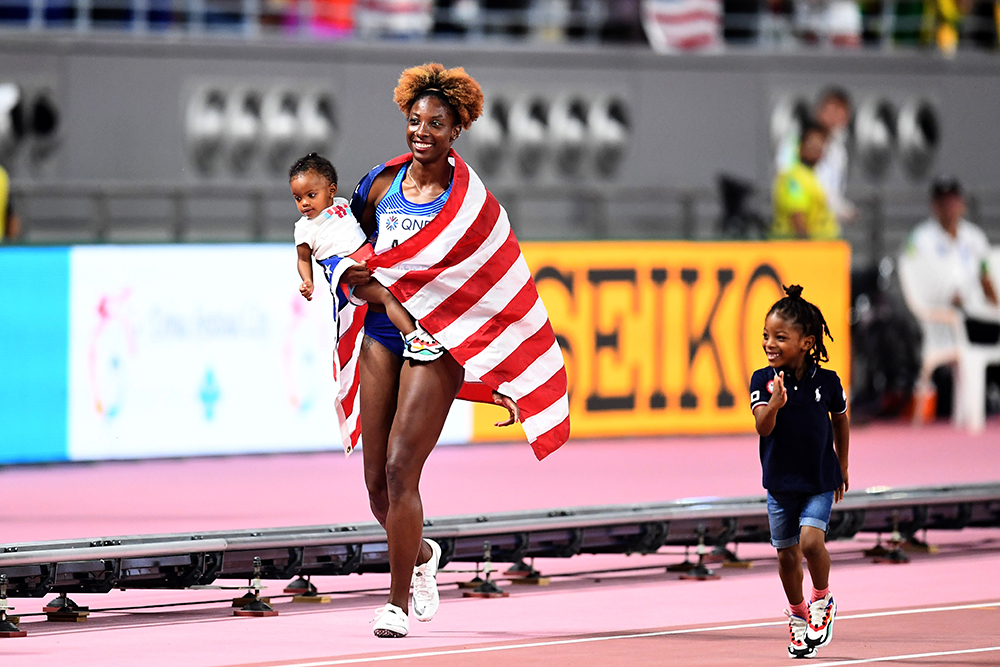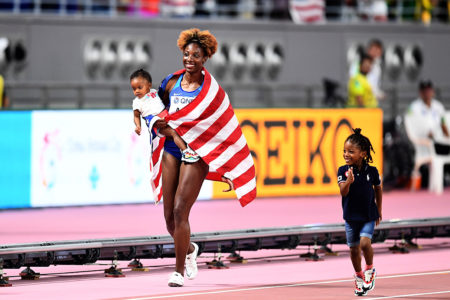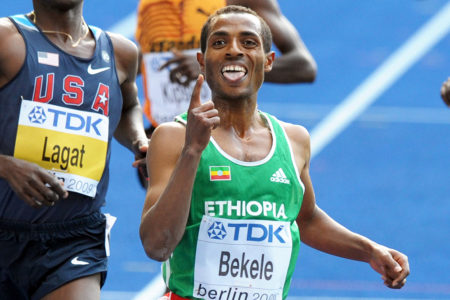
AS NIA ALI and her children watched her boyfriend, Canadian sprint ace Andre De Grasse, do one of his laps of honor in Doha, her son Titus got very excited. She says, “Once he saw him, he was like, ‘I can’t wait to get down there.’ And I was like, ‘Wait a minute! You know, I actually have to do something to get that lap. It’s not just given to me.’ Oh thank God I was able to pull that off!”
But who outside of her family would have guessed that Ali, at age 30, would win the gold medal in a stunning 12.34, the fastest race of her life? She had only won one minor race all year. For the past 3 years plus she had been beaten by Keni Harrison every single time they had raced. Striking was Ali’s comment that she had seen it all coming: “crossing that finish line after having visualized it over and over again.”
A simple question: How? The rest of the world did not see this coming. “If you’re a dark horse, that’s just part of the game,” she explains. “You haven’t done anything all year. You can’t expect for other people to see the vision because they don’t know what you’re doing behind closed doors.” What Ali was doing, ever since she and De Grasse welcomed daughter Yuri in June ’18, was working her tail off: “If you ask my training partners, when I warm up, it’s fast. When I warm down, it’s fast. I always treat my warmup like the workout and the workout like the extra credit because I knew I was coming from behind. I wanted to make myself super-tired in a warmup so when I got to the workout it was always a challenge for me. I just did everything full out and I knew I needed to do that this time around because one baby is one thing, but two, you just can’t take anything for granted just because you did it one time.”
Another big difference came on the coaching side. “Andre wanted to make a coaching change and we wanted to go somewhere where we could both be successful. It was a family move and a family decision.” They ended up in Jacksonville, Florida (and Bochum, Germany) working with respected coach Rana Reider. “He’s such a track nerd, and it’s perfect for me because I have so many questions,” she says. “It’s just been great to come at him with any question and get an answer or have him think about it non-stop, 24/7. He pours his heart out and he’s super passionate about track.”
Ali admits that as a mother, the hardest part of it all is leaving the kids behind when she’s at the training camp in Germany. “I made a lot of sacrifices. That was super tough. I did find time to travel back and forth, but I had to be smart about it because obviously it’s not good for your body. It was so emotionally hard for me to only FaceTime them and be able to see them every once in a while, but I’m just happy it paid off and they were able to take that victory lap with me.”
For Ali, the entire process—the sacrifice, the training, the battling in the hurdle wars, the losses along the way—was an act of faith. “You gotta have faith,” she says. “I mean I’m just putting it all out there and going so hard and trying to do everything to the best of my abilities. I had nothing but faith because I totally took my body to new places and there were a lot of things that I hadn’t done in the past that I did this year. So that gave me a lot of hope.”
She had to work to keep the defeats from rattling her. “It’s like it is for everyone. We work hard and we all want to be No. 1, but there’s only one place for that,” she says. “So just because you don’t stand there all year round doesn’t mean that you don’t have the potential to do so. It just means that maybe your training isn’t geared towards that moment or you just have to put certain things together. I knew that I wasn’t primed up all year to do what I did at that championship. So I just trusted my coaching and trusted that I was kinda unloaded and ready to go. All my takeaways and experiences, I was able to put it together at that point in time.”
Of her 12.44 in the Doha semis, which broke a PR that had been sitting on the shelf for 6 years, she says, “It didn’t shock me. It excited me because I had been waiting for that to come all year. When it actually came, I was like, ‘OK, now this is my moment.’”
Looking ahead, now one of history’s 10 fastest, she says, “This just gives me more drive. I know that this performance not only inspired mothers, but a lot of my competitors as well. They couldn’t predict that I would have crossed the line first and especially in a time like that. I know that always lights fires under people. It makes me more motivated. You know, it could be the last time I ever have a big performance like this, so I have to make sure that I’m doing everything I can in my power to be able to get on that team for Tokyo and try to have an even better turnout that I did before.”
And beyond 2020? “Now that I have the bye for ’21, that’s awesome. So definitely 2021. This year was hard and having to be away from my children—I wanted to be there a lot more. So long as I can balance that and it’s still fun, then I’ll keep going. If my body holds up, I’ll keep going. I like for my children to be able to see me being a parent and going out there and challenging myself every day, breaking limits.”






